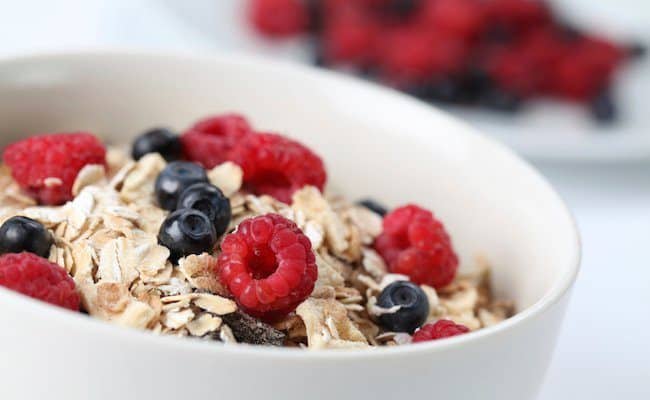
Breakfast is often suggested as the most important meal of the day, and there may be good reason for this. Some observational studies suggest eating breakfast is associated with maintaining weight loss, may lower risk for heart disease and can increase your daily intake of vitamins, minerals and fiber.
Emphasis is put on what you should eat for breakfast, not necessarily when. How long you wait to eat after waking up can depend on many things.
A common suggestion for eating in the morning is to eat within about an hour from waking up to provide your body energy after an overnight fast.
However, this doesn’t mean eating before or later than 60 minutes from waking up is not as beneficial.
Focusing on overall eating patterns, not just breakfast, is important for health.
Some studies suggest people who eat most of their food intake later in the day may not be as successful for weight loss as those who eat most of their food earlier in the day.
Therefore, eating more in general earlier in the day instead of in the evening may be helpful for weight loss and may benefit overall health.
Benefits of eating a healthy breakfast
The National Weight Control Registry (NWCR) tracks the habits of people who have actually lost weight and kept it off.
Data from the NWCR suggests over three fourths of people on the NWCR eat breakfast every day (1).
Researchers suggest eating breakfast may be a key factor for maintaining weight loss success.
A study from Harvard School of Public Health (2) found men who regularly skipped breakfast had about a 25% higher risk of death from heart disease.
People who skip breakfast are also more likely to feel hungrier later in the day and eat more food at night.
People who eat breakfast can have a healthier diet over all because they can have higher intakes of vitamins, minerals and fiber (3).
Benefits of eating earlier in the day
Why is breakfast associated with so many health benefits?
Looking at timing of food intake, not just the amount, appears to also have an impact on health.
A 2013 study (4) put overweight and obese women on two different diets for 12 weeks. Both diets had equal calorie amount of 1,400 calories per day.
The only difference was one group had a large breakfast intake and a small dinner meal while the other group had a small breakfast intake and a large dinner intake.
Researchers found the large breakfast group had more weight loss and great waist circumference reduction compared to the large dinner group.
Another 2013 study (5) showed similar results with nutrient timing. Researchers grouped participants into early or late eaters according to the timing of their main meal for the day.
Participants who were considered late eaters had slower weight loss over 20 weeks compared to those in the early eater group.
These studies suggest eating most of your calorie intake earlier in the day may be helpful for weight loss.
How long should you wait to eat?
There is no set time requirement for optimal time to eat breakfast.
Depending on your morning schedule, whenever you can fit it in is the best time to eat whether it’s when you first wake up to an hour afterwards.
Some websites suggest optimal time to eat breakfast is between 30-60 minutes after waking up.
The rationale for this is when you first wake up, you are coming off between a 6-8 hour fast. Eating something relatively soon when you wake up can help boost your metabolism.
If it’s not practical for you to eat breakfast at this time, don’t worry. Whenever you can fit it in is beneficial.
If you exercise in the morning, you may also wait longer before eating breakfast and that’s definitely ok.
After exercise, your body is ready for an influx of fuel and energy, so you should eat something after exercise in the morning.
What if you’re not hungry in the morning?
Do you have to eat something even if you’re not hungry?
Even though there have been many benefits associated with eating breakfast, some studies also suggest skipping breakfast may not be so detrimental.
For example, a 2014 study (6) concluded a recommendation to eat or skip breakfast for weight loss didn’t have an effect on weight loss in free living adults.
Therefore, researchers concluded contrary to popular opinion, in this study eating breakfast or skipping it didn’t have an effect on weight loss.
The bottom line is what and when are you eating the rest of the day?
If you’re not eating breakfast because you eat a large meal at night, you may want to shift your food intake to eating more food earlier in the day.
However, if you eat most of your food intake earlier in the day but you just aren’t hungry first thing in the morning that may not be so bad.
Looking at the bigger picture with your food intake is most important.
What should you eat for breakfast?
Remember, when you eat breakfast is not the only question you should be asking.
What you are eating for breakfast is important.
Eating sugary cereal or a pastry for breakfast won’t bring any health benefits associated with eating breakfast.
It’s important to fuel with the right foods at any time of the day but especially first thing in the morning.
Choose a breakfast that is high in fruits, vegetables, whole grains, legumes, protein and healthy fats.
It doesn’t have to be fancy; breakfast can be grabbing a Greek yogurt container, a banana and a handful of nuts in a to go container.
If you’re rushing around in the morning, try drinking your breakfast with a homemade smoothie.
You can also make your breakfast the night before to save you time in the morning.












